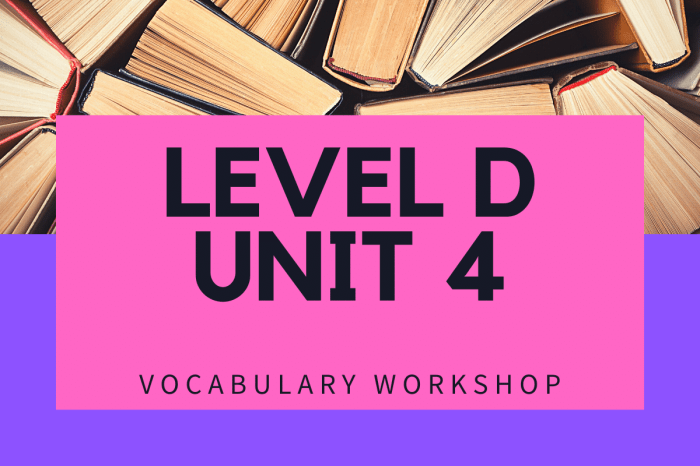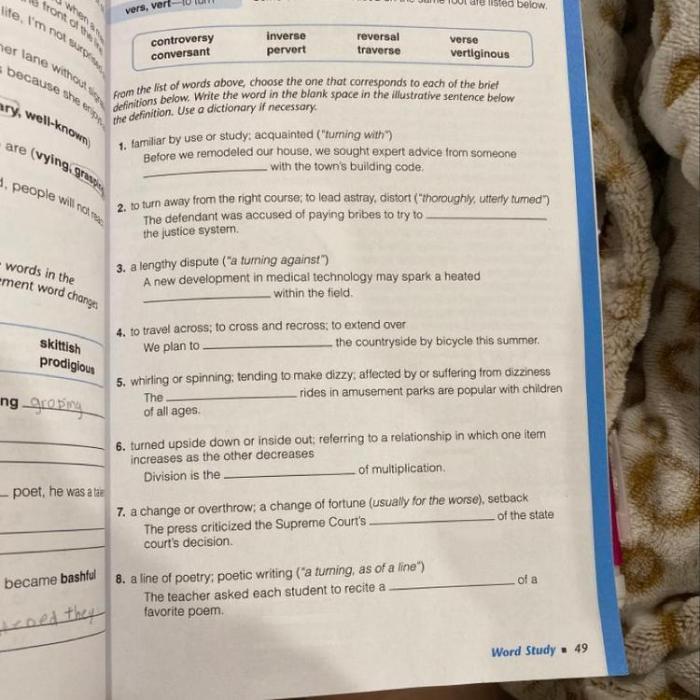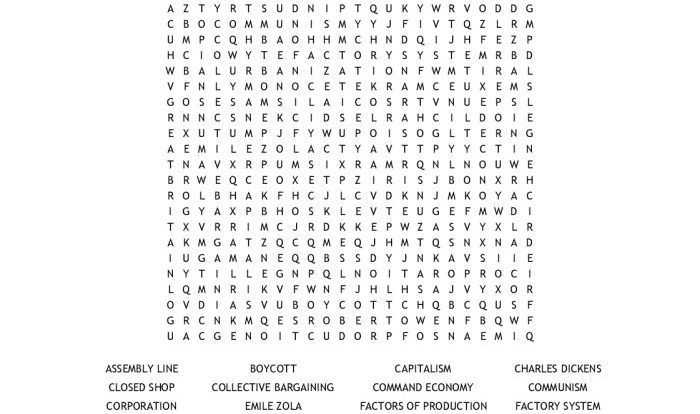Embark on an educational odyssey with Sadlier Vocabulary Workshop Answers Level D, an invaluable resource meticulously crafted to ignite students’ linguistic prowess. This comprehensive guide unlocks the gateway to a world of captivating word study activities, interactive exercises, and effective assessment strategies, empowering educators to foster a deep understanding and appreciation of vocabulary.
With a keen focus on level D students, this workshop delves into the fascinating realm of etymology and context, unveiling the hidden origins and nuances of words. Engage students in collaborative learning experiences through interactive games, puzzles, and simulations, fostering peer-to-peer knowledge exchange.
Word Study Activities
Vocabulary workshops provide structured opportunities for students to develop their vocabulary skills. These workshops can help students improve their reading comprehension, writing fluency, and overall communication abilities.
Some engaging word study activities for level D students include:
- Word mapping: Students create visual representations of words, including their definitions, synonyms, antonyms, and examples of usage.
- Etymology exploration: Students investigate the origins and history of words to understand their meanings and nuances.
- Contextual analysis: Students examine words in the context of sentences and passages to infer their meanings and usage.
- Root word analysis: Students identify and analyze root words to understand the relationships between words and their meanings.
- Affix study: Students learn about prefixes, suffixes, and other affixes to expand their vocabulary and improve their understanding of word structure.
Role of Etymology and Context in Vocabulary Development
Etymology, the study of word origins, provides valuable insights into the meanings and usage of words. By understanding the historical roots of words, students can develop a deeper understanding of their nuances and relationships to other words.
Context, the surrounding words and sentences in which a word appears, is also crucial for vocabulary development. By examining words in context, students can infer their meanings and usage, even if they are unfamiliar with the words themselves.
Interactive Vocabulary Exercises: Sadlier Vocabulary Workshop Answers Level D
Interactive vocabulary exercises provide engaging and effective ways to reinforce vocabulary learning. These exercises can promote collaboration, peer learning, and a deeper understanding of vocabulary concepts.
Some examples of interactive vocabulary exercises include:
- Vocabulary charades: Students act out vocabulary words while their classmates guess the words.
- Vocabulary Pictionary: Students draw vocabulary words on a whiteboard or paper while their classmates guess the words.
- Vocabulary Bingo: Students play Bingo using vocabulary words as the squares on the Bingo cards.
- Vocabulary puzzles: Students solve crossword puzzles, word searches, and other puzzles that incorporate vocabulary words.
- Vocabulary simulations: Students engage in role-playing or other simulations that require them to use vocabulary words in context.
Collaboration and Peer Learning
Interactive vocabulary exercises promote collaboration and peer learning by providing opportunities for students to work together to learn new words. By sharing ideas, discussing meanings, and working together to solve problems, students can deepen their understanding of vocabulary and develop their communication skills.
Assessment and Evaluation
Effective assessment is essential for monitoring student progress and providing feedback on vocabulary development. Various assessment strategies can be used to evaluate student learning, including:
| Assessment Strategy | Description |
|---|---|
| Vocabulary quizzes | Short quizzes that assess students’ knowledge of vocabulary words and their meanings. |
| Vocabulary tests | Formal tests that assess students’ overall vocabulary development, including their ability to define words, use them in context, and understand their nuances. |
| Vocabulary portfolios | Collections of student work that demonstrate their vocabulary development over time, including word lists, definitions, and examples of usage. |
| Oral presentations | Students present their understanding of vocabulary words through oral presentations, explaining their meanings, usage, and connections to other words. |
| Writing assignments | Students incorporate vocabulary words into their writing assignments, demonstrating their understanding of their meanings and usage. |
Ongoing Evaluation and Feedback, Sadlier vocabulary workshop answers level d
Ongoing evaluation and feedback are crucial for supporting student vocabulary development. By providing regular feedback on student progress, teachers can identify areas where students need additional support and provide targeted instruction to help them improve their vocabulary skills.
Differentiation and Individualization

Differentiation and individualization are essential for meeting the diverse needs of learners in the classroom. By providing differentiated instruction, teachers can tailor vocabulary instruction to the specific learning styles, interests, and abilities of each student.
| Differentiation Strategy | Description |
|---|---|
| Tiered activities | Activities that are designed at different levels of difficulty to meet the needs of students with varying abilities. |
| Flexible grouping | Grouping students based on their vocabulary needs and interests to provide targeted instruction. |
| Individualized learning plans | Customized learning plans that address the specific vocabulary needs of each student. |
| Technology-supported learning | Using technology tools and resources to support vocabulary development, such as online vocabulary games, apps, and websites. |
Role of Technology in Supporting Differentiated Vocabulary
Technology can play a significant role in supporting differentiated vocabulary instruction. By providing access to a wide range of resources and tools, technology can help teachers create individualized learning experiences that meet the needs of each student.
Integration with Other Subject Areas

Integrating vocabulary instruction with other subject areas can provide students with meaningful and authentic opportunities to learn and use new words. By connecting vocabulary to real-world contexts, students can develop a deeper understanding of the words and their applications.
Some examples of how to incorporate vocabulary learning into other subject areas include:
- Science: Students learn vocabulary related to scientific concepts, such as photosynthesis, evolution, and the solar system.
- Social studies: Students learn vocabulary related to historical events, geographical features, and cultural traditions.
- Math: Students learn vocabulary related to mathematical concepts, such as algebra, geometry, and calculus.
| Subject Area | Vocabulary Connections |
|---|---|
| Science | Photosynthesis, evolution, solar system |
| Social studies | Historical events, geographical features, cultural traditions |
| Math | Algebra, geometry, calculus |
Benefits of Integration
Integrating vocabulary instruction with other subject areas provides several benefits, including:
- Increased motivation and engagement: Students are more likely to be motivated to learn new words when they can see how they apply to real-world situations.
- Improved comprehension: Students can better understand the content of other subject areas when they have a strong vocabulary base.
- Enhanced critical thinking skills: Students can develop their critical thinking skills by analyzing and using vocabulary in different contexts.
Popular Questions
What are the key benefits of using Sadlier Vocabulary Workshop Answers Level D?
Sadlier Vocabulary Workshop Answers Level D provides a structured and engaging approach to vocabulary development, fostering students’ word recognition, comprehension, and usage skills.
How does the workshop incorporate etymology and context in vocabulary learning?
The workshop delves into the etymological roots and contextual usage of words, helping students understand the historical evolution and subtle nuances of language.
What types of interactive exercises are included in the workshop?
The workshop features a wide range of interactive exercises, including games, puzzles, and simulations, designed to reinforce vocabulary learning and promote collaboration among students.
